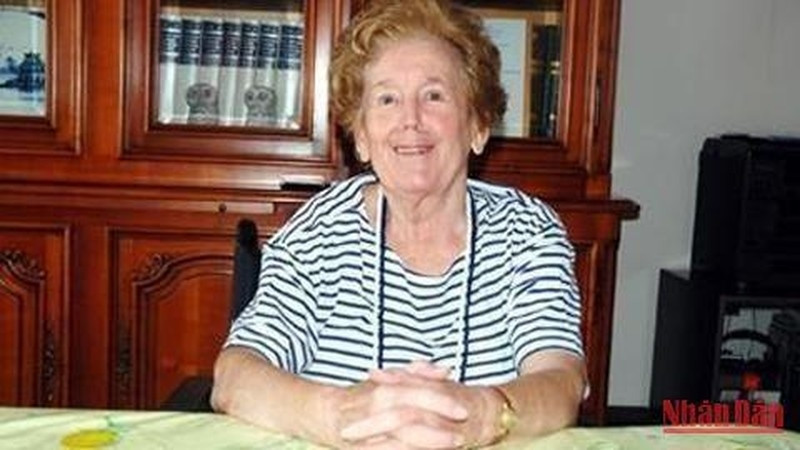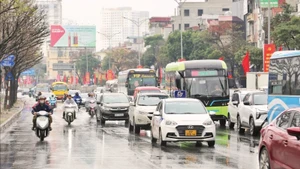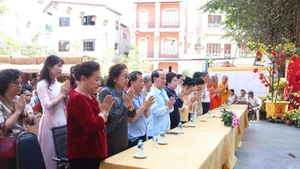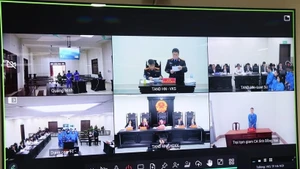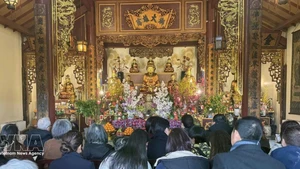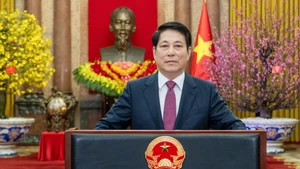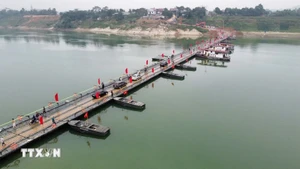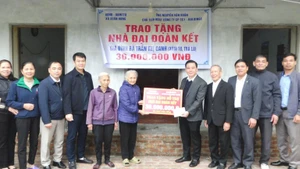Raymonde Dien was born on May 13, 1929, in Mansigné, a commune in the Sarthe department in the region of Pays de la Loire in western France. From a young age, Raymonde Dien had to witness her family's suffering caused by the Second World War. Therefore, she was always thinking about how to end pain and loss for everyone.
Inheriting the family tradition of fighting for peace, as her father was a member of the French Communist Party, she soon participated in political and social activities and was admitted into the French Communist Party when she was only 18 years old.
Raymonde Dien’s first job in her life as a member of the French Communist Party was as a secretary and liaison of a party organisation in Tours.
During the 1950s, French people nationwide actively took part in the movement against the French war in Vietnam and Indochina. Workers at many major French ports went on strike in protest of shipping weapons to Vietnam. French communists, including Raymonde Dien, also actively responded to this movement and took to the streets to call for peace in Vietnam.
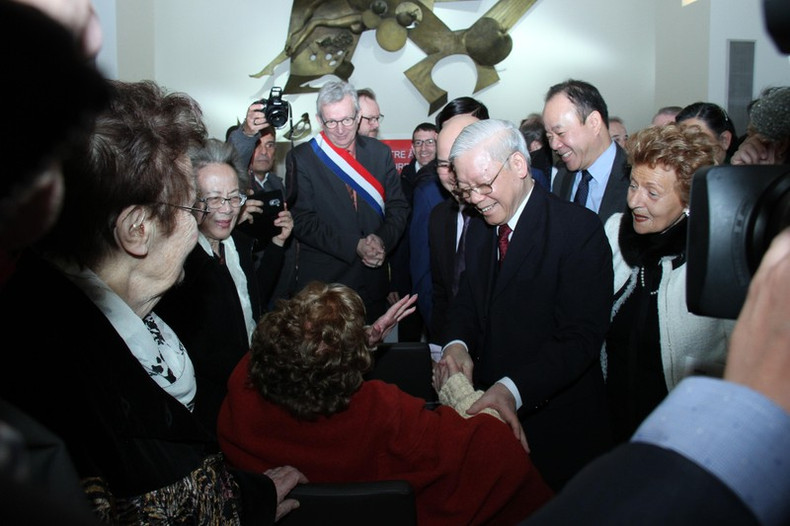
General Secretary Nguyen Phu Trong meets Raymonde Dien on March 26, 2018, during his official visit to France.
On February 23, 1950, at the train station of Tours, a shocking event took place when the young Raymonde Dien lay on the tracks to block a train carrying weapons to Indochina.
Early that afternoon, upon hearing news that a train carrying weapons to Indochina was about to pass through the Tours station, the Tours Party Committee immediately directed its party members and outstanding members of the masses to protest at the station.
Raymonde Dien and her comrades at the office quickly went there and saw a large crowd with banners and posters protesting against the French war in Indochina spread all over the station platform. They chanted slogans against the war.
A few minutes later, the train loaded with weapons would make its way through Tours station towards the harbour and then all would be loaded on a ship to the Indochina battlefield. Despite the opposing crowds waving banners, the train crept coldly across the platform. In a short while, that train would pass the protesters to transfer weapons to a ship to Indochina.
Suddenly, a young woman jumped down on the track, blocking the front of the train. Too surprised by such a brave act, the train driver was forced to use the emergency brake. Fortunately, the front of the train stopped just a few inches from the woman. The woman who dared to block that train at Tours station on the afternoon of February 23, 1950, was a young member of the French Communist Party, Raymonde Dien. At that time, Raymonde Dien was less than 21 years old.
The train was forced to stop, and the protesters had the opportunity to act, chanting anti-war slogans. As a result, the train carrying weapons to Indochina could not reach the delivery point on time.
That same afternoon, Raymonde Dien was taken away by the Police. Despite applying all methods of interrogation to find the mastermind of such anti-war activities, the police still could not subdue Raymonde Dien’s spirit.
She simply replied: “It was an anti-war act of my own making, without anyone instigating it. I do it because I hate war. I don't want to see any more bloodshed. I want peace.”
On June 1, 1950, after more than three months of torture, all forms of interrogation, intimidation, and temptation could not frighten the young female French Communist Party member. The court trial of Raymonde Dien was conducted in the city of Bordeaux. Raymonde Dien was found guilty of a “serious breach of national security”. She was sentenced to a year in prison, and later imprisoned in Bordeaux.
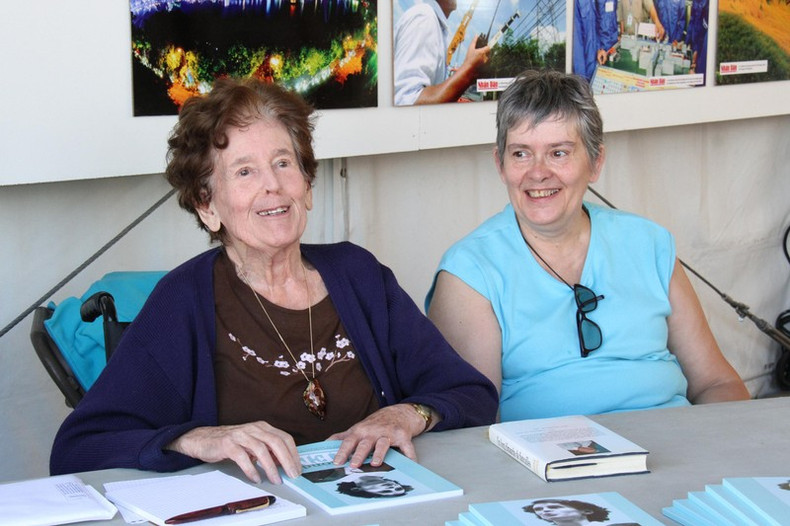
Raymonde Dien visited the exhibition booth of Nhan Dan Newspaper and signed autographs about her life fighting for peace at the L’Humanité newspaper festival on September 13, 2014.
Disgruntled at the sentence for the young woman who bravely spared herself to defend the peace, protests in support of Raymonde Dien broke out across France.
The French Communist Party organised protests on an increasingly large scale and attracted more and more people. The solidarity of the peace-loving people in France, as well as around the world, gave her more energy and confidence to overcome all difficulties during her detention.
The persistent struggle activities of the French Communist Party together with progressive people in France and peace-loving people around the world brought about results. Raymonde Dien was released on December 23, 1950, ten months after being arrested.
February 23, 1950, has gone down in history as a symbol of the noble international proletariat, featuring the most beautiful image in the life of a female member of the French Communist Party, and at the same time encouraging the Vietnamese people against the French colonialists.
Since then, Raymonde Dien, along with other French Communist Party members and French friends such as Raymond Aubrac, Henri Martin, Madeleine Riffaud, and Charles Fourniauhave always supported the Vietnamese people in the struggle against colonialists. They became soldiers for peace, contributing to promoting the movement in support of Vietnam.
Many years have passed, and this historical event has always been remembered by Vietnamese people, as well as the world’s peace-loving people. After that time, Raymonde Dien continued to participate in activities to fight for peace in Vietnam.
She once said: “I am very proud to be in the French Communist Party during 1947 and join the fight for peace. I constantly follow information about the war in Vietnam through L'Humanité (Humanitarian) newspaper, the voice of the French Communist Party, and know that so many people there were killed and so many schools, hospitals, and factories were destroyed. That’s why I always tell myself to do something to stop this carnage....”
Whenever she had the opportunity to talk about the brave act on February 23, 1950, she said emotionally: “I follow the voice of my heart. I do not understand what force caused me to react immediately. I shouted to my comrades to stop this train. Then I decided to act fast and rush to the tracks. Fortunately, the train stopped a few inches from me and could not arrive at the delivery point as scheduled.”
Then she put her hand across her chest, choking with emotion, saying: “Vietnam is always on my mind. That’s why I decided to use my body to block that train of destruction.”
In 1956, on her first visit to Vietnam, she accompanied Henri Martin, also a very close French friend of Vietnam, one of the pioneers in the movement against the French colonial war in Vietnam and Indochina.
That time, Raymonde Dien met Uncle Ho, a touching meeting that she often mentioned every time she had the opportunity. It is a memory that has always been in her mind when she met the beloved President Ho Chi Minh, a leader who is admired and respected by progressive people all over the world.
She said that through Uncle Ho’s kind greetings and by seeing the devastation of war with her own eyes, she saw more clearly the priceless value of peace.
Coming to Vietnam, she realised that this was a senseless war because the French army only caused pain and loss to the Vietnamese people, just like the French people had to suffer during the second world war.
In 2004, on the occasion of the 50th anniversary of the Dien Bien Phu victory, Raymonde Dien and her friend Henri Martin returned to Vietnam, witnessing the rapid changes in Uncle Ho’s homeland. It was also the happiness and pride that she often mentioned when she saw Vietnam moving forward under President Ho Chi Minh's will.
On September 2, 2004, Raymonde Dien and Henri Martin were honoured to receive the Vietnamese State's Friendship Medal.
Raymonde Dien always wished Vietnam would become a beautiful country and destination for people all over the world, so they would realise the great sacrifices that the Vietnamese people made during the war.
Like many French friends who love peace and Vietnam, Raymonde Dien had a special love for and wholeheartedly supported the country.
She often said she always followed the steps of Vietnam, was deeply saddened by the sacrifices caused by the war and was happy with the country’s successes. All her life, she left her love in Vietnam. “We are all descendants of Uncle Ho”, she said.
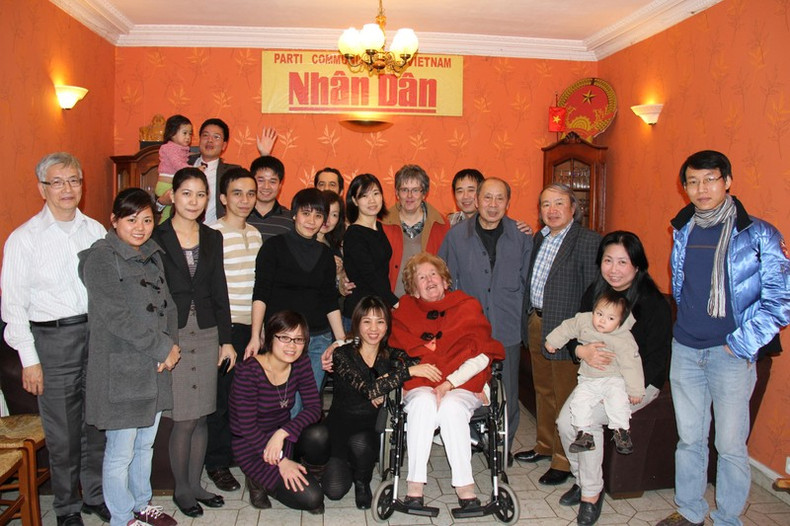
Raymonde Dien visited the representative office of Nhan Dan newspaper in France on March 11, 2012.
In recent years, she tried to attend events related to Vietnam despite her old age and weak health. She always regretted that she was not as healthy as before to directly join activities assisting Vietnam, especially those who are living in difficulties and severely affected by Agent Orange.
It has been 72 years since the historic event on February 23, 1950, at a railway station near Tours city. It changed her life and helped her gain a strong attachment to Vietnam. Despite changes, the sentiment of the French Communist Party’s female member toward Vietnam remained until she passed away.
Raymonde Dien passed away, leaving deep grief in the hearts of French friends and the Vietnamese people. However, the image of Vietnam’s great friend, who always held in her heart a special love for Vietnam, will always remain. The example of fighting for peace and Vietnam will continue to inspire the younger generations to make efforts to cultivate and further enhance the long-standing solidarity and friendship between the two countries.
